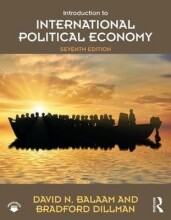Summary: Introduction To International Political Economy | 9781138206991 | David N Balaam, et al
- This + 400k other summaries
- A unique study and practice tool
- Never study anything twice again
- Get the grades you hope for
- 100% sure, 100% understanding
Read the summary and the most important questions on Introduction to International Political Economy | 9781138206991 | David N. Balaam & Bradford Dillman
-
1 What is International Political Economy
This is a preview. There are 10 more flashcards available for chapter 1
Show more cards here -
What is the postwar world order?
- A global management structure that began in 1944 when the allies met during World War II in Yalta to discuss the future of Europe.
- For the past three-quarters of a century the world's "Great Powers" have avoided a nuclear war and another conventional war like WWII.
- Also promoted development in former colonies and conditioned the actions of international organizations and businesses by gradually expanding liberal international trade and monetary policies.
- Another objective was to allow space for NGOs and civil society to affect issues such as political rights and liberties, education, the environment, and labour.
- A global management structure that began in 1944 when the allies met during World War II in Yalta to discuss the future of Europe.
-
Is the postwar world order ending?
It might be the case since the regime is not static, but ever-evolving and therefore might evolve into something else. -
What three phases can we divide the postwar order in?
1944-1973
1974-1991
1992-2017
None of these three phases has an abrupt beginning or end' some characteristics from one phase will persist into the next. However, we contend that there is a distinct zeitgeist and set of feature in each phase. -
Why do we study IPE interdisciplinarily?
We study it in an effort to return to the kind of analysis done by politicaltheorists and philosophers before the study of human social behaviour becamefragmented intodiscrete fields in the social sciences.
Although disciplinaryspecialization enhances analytical efficiency, a single discipline offers an incomplete explanation of global events. -
What are the three central elements of the fields of study that contribute to IPE?
1. Political dimension: use of power by individuals, domestic groups, states (acting as single units), international organizations, NGOs and transnational corporations (TNCs). Decisions about the distribution of tangible (money and products) and intangible (security and innovation) things.
2. Economic dimension: how are resources distributed in markets, among individuals, groups and nation-states. Charles Lindblom: the economy is nothing more than a system for coordinating social behaviour.
3. Societal dimension: states and markets do not exist in a social vacuum. There are usually many different social groups within a state and transnational. -
The late political economist Susan Strange was a major force in the field of IPE. What question was her starting point in studying the relationships between states, markets and the society in the international political economy?
Who benefits? Cui bono? -
What are the four dominant perspectives in IPE?
- Economic liberalism
- Mercantilism
- Structuralism
- Constructivism
- Economic liberalism
-
What is economic liberalism?
The ideology and IPE perspective that holds that nations are best off when the state's role in the economy is minimized. It derives in part from fear of state abuse of power and in part from the philosophy of individualism and liberty of the Enlightenment. These ideas have been popular since the late 1970s and served as the foundation for the policies associated with globalization. -
What are the most common four levels of analysis in IPE?
- Global
- Interstate
- State-societal
- Individual
- Global
-
Susan Strange outlined five structures that function as the foundation of the international political economy. What are these?
- Production
- Trade
- Finance
- Security
- Knowledge?
- Production
- Higher grades + faster learning
- Never study anything twice
- 100% sure, 100% understanding
































